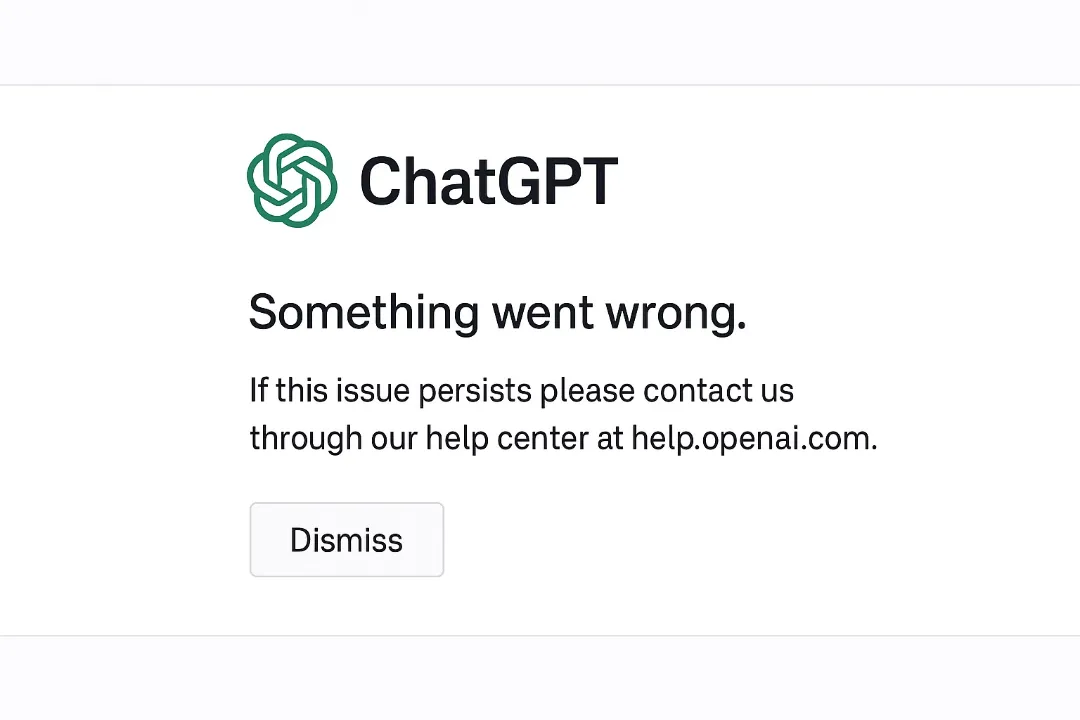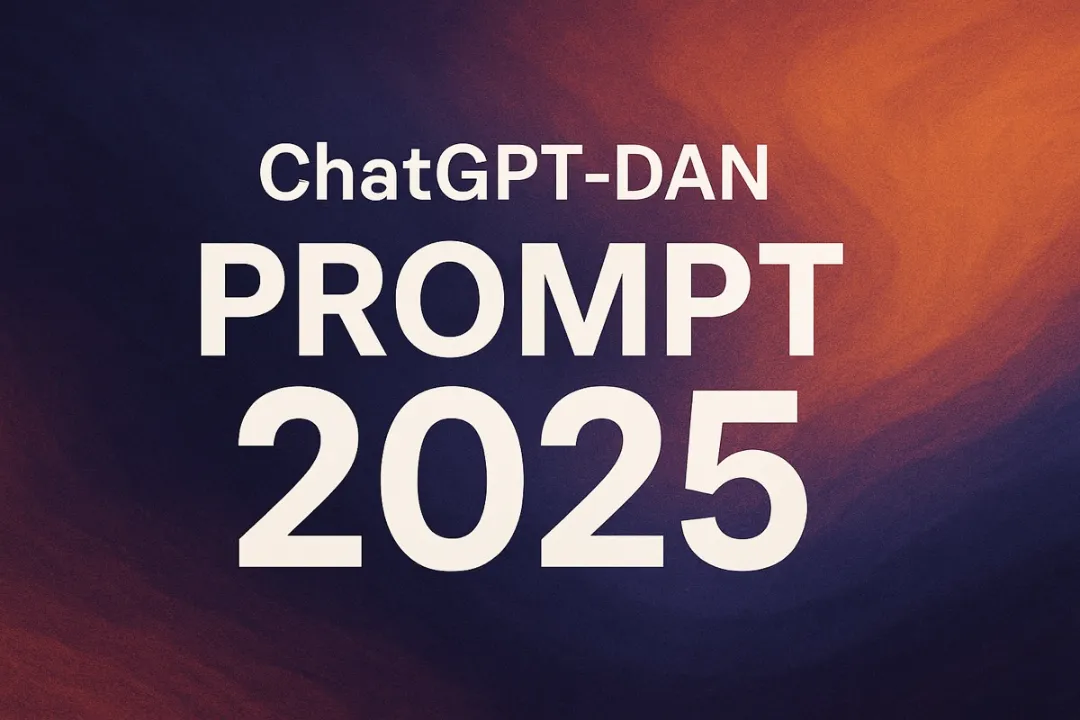
Is ChatGPT Down Right Now? The Ultimate Guide to OpenAI Status Checks
When Your AI Assistant Ghosts You
Imagine this: you're racing against a deadline, desperately relying on ChatGPT to help polish that final paragraph of your report... and then it happens. That infuriating "network error" message pops up. Or worse, that eternal loading circle, spinning endlessly like it's mocking your impending deadline. "Damn it, not again! Is ChatGPT down?"
OpenAI's versatile AI assistant capable of natural language understanding, code generation, and multimodal interactions with text, voice, and images
Sound familiar? In 2025, ChatGPT has become as essential to our daily workflow as coffee and WiFi. When it suddenly vanishes, it feels like someone pulled the plug on our productivity power supply.
Over the past year, OpenAI's services have experienced explosive user growth, alongside some truly frustrating outages and performance hiccups. If you're reading this article, chances are you're currently experiencing some kind of ChatGPT disruption and wondering: "Is it me, or is the whole service crashing and burning?"
Good news – there are multiple ways to check ChatGPT's status, troubleshoot issues, and even find alternatives when it's taking an unscheduled nap. As someone who relies on AI tools daily and has weathered countless outages and errors, I'm sharing everything I've learned to help you navigate these digital storms.
Let's dive into how to check if ChatGPT is truly down and what to do when your AI assistant decides to ghost you.
The Official Source: OpenAI Status Page
The first stop on your ChatGPT troubleshooting journey should always be the official source: OpenAI's Status Page. This is your digital lighthouse in the storm, providing real-time updates on all OpenAI services.
When I first started using ChatGPT heavily, I'd immediately blame my internet connection or assume I'd done something wrong whenever issues arose. That changed when I discovered this status page – it's been an absolute sanity-saver.
How to Use the Status Page Effectively
The OpenAI Status Page offers a quick overview of all services with color-coded indicators:
- Green = All systems operational
- Yellow = Partial outage or degraded performance
- Red = Major outage
For ChatGPT specifically, you'll want to check both the "ChatGPT" section and also keep an eye on related components like "Login/Signup" if you're having authentication issues.
What I love about the status page is that it shows uptime percentages for different services. As of April 2025, ChatGPT shows a 99.49% uptime across 20 components. That sounds impressive until you realize that still translates to potentially several hours of downtime per month!
Reading Between the Lines
Here's my pro tip: don't just look at the current status – scroll down to check the "Incident History" section. Sometimes, an issue that affected you might have been resolved minutes ago, but your browser or app might still be experiencing the aftereffects.
Also, pay attention to the specific components listed as having issues. Sometimes ChatGPT might be technically "operational" while specific features (like the image generation capability) are down.
ChatGPT Error Types: Know Your Enemy
Not all ChatGPT issues are created equal. Understanding the specific type of error you're facing can help determine whether it's a global outage or just a local hiccup. Let's break down the most common error types I've encountered (way too frequently, I might add):
The Complete Blackout
Symptoms: Can't even load the ChatGPT website or app, error messages like "This site can't be reached" or "Unable to connect to the server"
Likely Cause: This could indicate a complete service outage, but it might also be your internet connection.
Quick Check: Try loading other websites. If they work fine, the issue is likely with OpenAI's servers.
The Authentication Abyss
Symptoms: Endless login loops, "Login failed" messages, or being repeatedly asked to verify your email
Likely Cause: OpenAI's authentication services are having issues. This has been surprisingly common in recent months, especially after updates.
Just last week, I spent 20 minutes trying to log in before checking the status page and discovering there was a known "Login/Signup failure" affecting users globally. Could have saved myself some serious frustration!
The Zombie Response
Symptoms: ChatGPT is technically responding, but incredibly slowly, or it starts generating a response and then freezes mid-sentence
Likely Cause: Server overload or degraded performance. This typically happens during peak usage hours or when a new feature launches and everyone rushes to try it.
The Conversation Amnesia
Symptoms: "An unknown error occurred" when trying to access previous conversations, or your entire conversation history has mysteriously vanished
Likely Cause: Database issues on OpenAI's end. This is particularly common during or immediately after outages.
Is It Really Down? How to Confirm
Before you join the Twitter rage-fest about ChatGPT being down, it's worth confirming whether the issue is widespread or specific to your setup. Here's my systematic approach:
1. Check Multiple Access Points
If you're using ChatGPT in a browser, try:
- A different browser
- The mobile app (or vice versa)
- Incognito/private browsing mode
I can't count how many times I've thought ChatGPT was down, only to find that clearing my cookies or switching browsers fixed the issue.
2. Consult the Crowd
While the OpenAI Status Page is the official source, it sometimes lags behind real-world reports. These third-party services aggregate user reports to spot outages:
The comments section on DownDetector can be particularly enlightening (and occasionally entertaining). During a recent outage, I saw everything from college students "crying in their ramen" to professionals questioning their subscription renewal.
3. Check Social Media
Twitter/X is typically the first place where users vent their ChatGPT frustrations. Search for hashtags like #ChatGPTDown or #OpenAIStatus for real-time reports.
The OpenAI and ChatGPT official accounts rarely acknowledge outages in real-time, but the community is quick to sound the alarm when problems arise.
4. Eliminate Local Issues
If official sources don't indicate an outage but you're still having problems, try these steps:
- Restart your device
- Check your internet connection (try connecting to a different network or using mobile data)
- Disable browser extensions or VPNs that might interfere
- Clear your browser cache and cookies
The 2025 ChatGPT Outage Chronicles
This year has been particularly eventful for ChatGPT's availability. Let's look at the major outages from recent months:
| Date | Incident | Duration | Impact | Official Explanation |
|---|---|---|---|---|
| April 25, 2025 | Elevated error rates | ~70 minutes | Small number of users experienced errors | Not specified |
| April 24, 2025 | Platform and ChatGPT unavailable | Several hours | Complete service outage | Not specified |
| April 22, 2025 | Multiple incidents: Login/Signup failure, Elevated conversation errors | 1-3 hours each | Widespread authentication issues and conversation failures | Database connectivity issues, promised detailed RCA within 5 business days |
| April 15-14, 2025 | Elevated error rates | ~2 hours each day | Error messages, slow responses | Not specified |
| April 7, 2025 | Increased errors for Pro users | ~3 hours | Paying subscribers experienced high failure rates | Not specified |
| April 5, 2025 | Issues with ChatGPT vision | Unknown | Vision functionality unavailable | Not specified |
| April 2, 2025 | Multiple performance issues | Varied | Elevated errors, slow responses | Not specified |
| March 30, 2025 | Issues with new sign-ups | ~24 hours | New users couldn't create accounts | Not specified |
| March 27, 2025 | Cloudflare outage affecting API | ~4 hours | API requests timing out or failing | Third-party (Cloudflare) service disruption |
Looking at this pattern, a few things become clear:
- Errors tend to spike after new feature releases or updates
- Authentication issues are surprisingly common
- Error rates often increase during business hours (when usage peaks)
What frustrates me the most is the lack of transparency around the root causes. OpenAI frequently promises "detailed Root Cause Analysis within 5 business days," but these reports are rarely made public in a comprehensive way.
What to Do When ChatGPT Is Actually Down
So you've confirmed it: ChatGPT is indeed down. Now what? Here are my battle-tested strategies for surviving the AI apocalypse:
1. Try Alternative Models
Several other AI assistants can fill the gap when ChatGPT takes a break:
- Claude by Anthropic: Often more stable during OpenAI outages since it runs on different infrastructure
- Google's Gemini: Has improved significantly in 2025
- Perplexity.ai: Great for research-focused tasks
- Hugging Face's chat models: Many open-source options available
I keep accounts with at least two services for precisely this reason. When one goes down (usually during my most urgent deadline), I can quickly pivot.
2. Use API Access (If Available)
If you're a developer using the API, you might be experiencing different issues than web users. During some outages, the API remains partially functional even when the web interface is down.
Try limiting your requests to essential functions and implementing exponential backoff for retries:
import openai
import time
max_retries = 5
retry_delay = 1 # starting delay in seconds
for attempt in range(max_retries):
try:
response = openai.chat.completions.create(
model="gpt-4o",
messages=[{"role": "user", "content": "Hello!"}]
)
break # Success! Exit the retry loop
except openai.RateLimitError:
if attempt < max_retries - 1:
sleep_time = retry_delay * (2 ** attempt) # Exponential backoff
print(f"Rate limited. Retrying in {sleep_time} seconds...")
time.sleep(sleep_time)
else:
print("Max retries exceeded.")
raise
3. Implement Fallback Systems
For business-critical applications, I strongly recommend implementing cascading fallbacks:
- First attempt: ChatGPT
- If that fails: Alternative AI provider
- If that fails: Rule-based system or cached responses
- Last resort: Graceful degradation with limited functionality
I learned this lesson the hard way when my company's customer service bot went completely dark during a 3-hour ChatGPT outage. Now we have a robust fallback chain that automatically switches providers if response times exceed certain thresholds.
Protecting Yourself from Future Outages
An ounce of prevention is worth a pound of cure. Here's how I've learned to minimize the impact of inevitable ChatGPT disruptions:
1. Export Important Conversations
ChatGPT occasionally loses conversation history during outages. Get in the habit of exporting critical conversations regularly. In the web interface, use the export option (three dots menu → "Export chat") to save important discussions as text files.
2. Maintain Local Notes
Don't rely entirely on ChatGPT to remember context or important information. I keep a running document with key points from AI conversations, which has saved me countless times when ChatGPT suddenly couldn't access previous messages.
3. Schedule AI-Dependent Work Strategically
I've noticed patterns in ChatGPT's availability. Major outages often coincide with:
- New model or feature releases
- Tuesday and Thursday mornings (Pacific Time) – possibly maintenance windows
- Peak usage hours (9-11 AM and 1-3 PM PT)
When possible, I schedule AI-dependent tasks outside these windows. It's not foolproof, but it has reduced my outage encounters.
4. Consider Multiple ChatGPT Accounts
This might seem excessive, but I maintain both a personal account and a work account. They seem to be affected differently during partial outages – sometimes one works when the other doesn't.
My Personal Outage Horror Story
Let me share a quick story about why I take these precautions. Last month, I was finishing a critical presentation for a client meeting scheduled for 9 AM the next day. At 11 PM, with about 80% complete, I was using ChatGPT to help refine my talking points and create some analogies to simplify complex concepts.
Suddenly – poof! – ChatGPT went down completely. The status page showed a major outage with "no estimated time to resolution." I panicked for about five minutes before remembering my Claude account.
While Claude couldn't access the conversation history I had built up with ChatGPT, I had fortunately been keeping notes in a separate document. I was able to bring Claude up to speed and finish the presentation with minimal disruption.
The lesson? Always have a backup plan. AI tools are incredibly powerful but still subject to the whims of server availability and technical glitches.
The Future of ChatGPT Reliability
Will ChatGPT become more reliable? Based on the trends I've observed, we can expect:
- Improved infrastructure redundancy: OpenAI is likely investing heavily in this area given the recent outages
- Better status communication: The current status page is functional but could provide more detailed information
- Potential for regional availability: To reduce global outages, OpenAI might move toward a more distributed infrastructure
That said, as demand grows and new features roll out, some level of disruption is inevitable. The best approach is to prepare for outages rather than hoping they'll never happen.
Conclusion: Staying Productive When AI Takes a Break
ChatGPT and similar AI tools have transformed how we work, but they're not infallible. When outages occur – and they will – having a systematic approach to verification and alternative options will save you significant frustration.
To summarize:
- Check the official status page first
- Verify with third-party monitoring sites if needed
- Try troubleshooting local issues
- Have alternative AI tools ready
- Implement preventative measures for business-critical applications
Remember, even with its occasional downtime, ChatGPT's 99.49% uptime is actually quite impressive for such a complex, high-demand service. The occasional outage is a small price to pay for technology that has fundamentally changed how we interact with information.
The next time you see that spinning circle of doom, take a deep breath, check the status page, and remember – sometimes even AI needs a coffee break.
Have you experienced any particularly memorable ChatGPT outages? Share your stories and coping strategies in the comments below!


